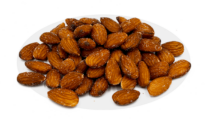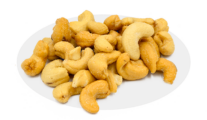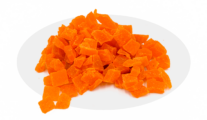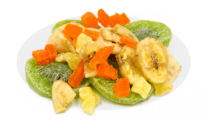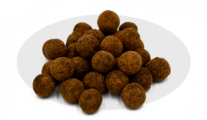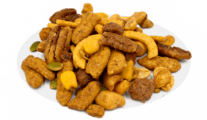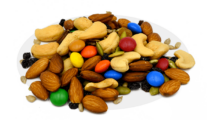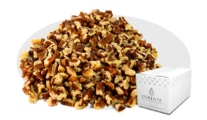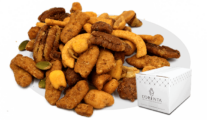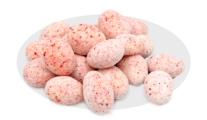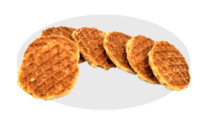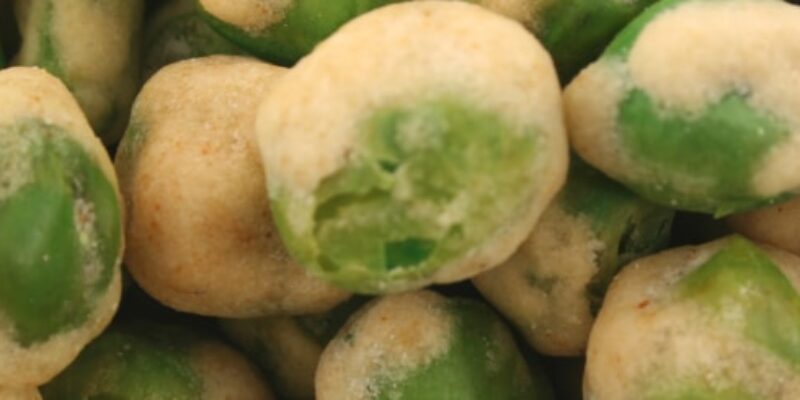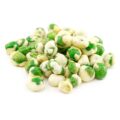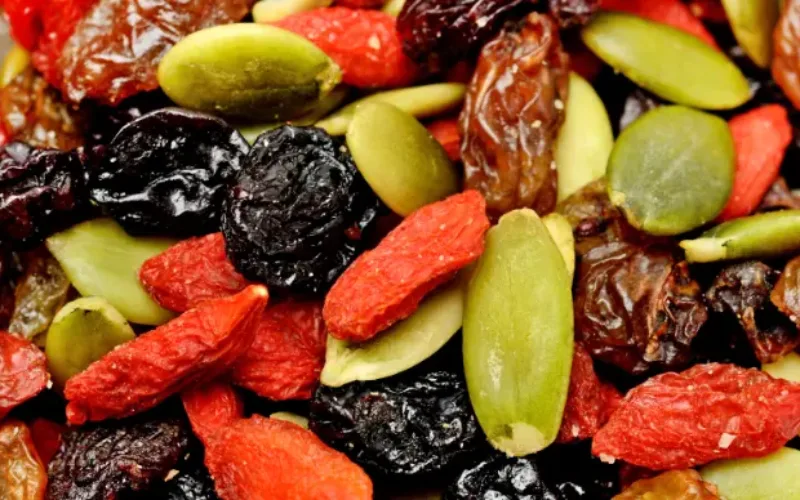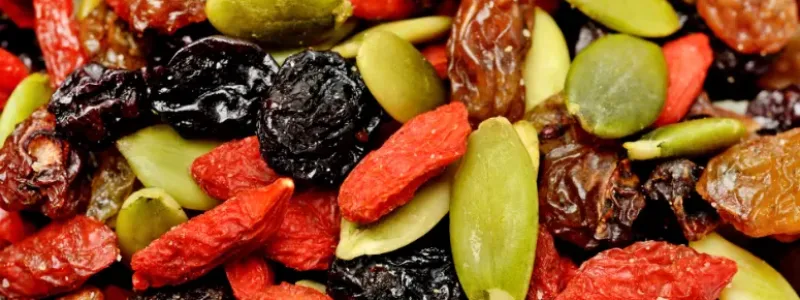Written By Sam Henselijn
Are Wasabi Peas Healthy? Wasabi peas are made from vegetables, so it’s ideal to think it’s a healthy snack. However, here is a shocking revelation: They are often dense in calories! Now, you might wonder: Are Wasabi Peas healthy? If dense in calories, does that mean they offer no health benefits? This article will provide convincing answers to these questions about their nutritional value!
Calories in Wasabi Peas
They are a healthy snack if eaten in moderation. 100 grams of these peas contain about 430 grams of calories. This means that these tiny snacks are packed with a lot of calories. So, if you eat just a small portion of them, you’d consume high calories. You have to be aware of your portion size to avoid weight gain.
Are Wasabi Peas Good For You?
Wasabi peas aren’t all bad. You’ll
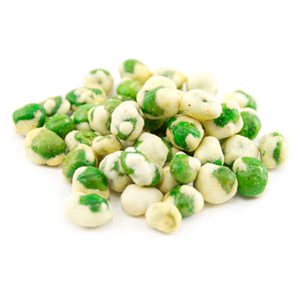
consume over an ounce of fiber. Fibers are known to keep digestion regular and prevent high cholesterol levels. So eating them will provide you with enough calories for your day.
They also contain small amounts of other nutrients. They provide a healthy dosage of protein. You’ll get four grams of protein for every serving of it, which is above the recommended protein requirements for an adult. Below is a detailed explanation of why wasabi peas are good for you:
1. They Have Plant Protein
Adults must get about 10 to 35% of their total calorie needs from protein. It means that 2000 calories contain about 100 grams of protein. Protein is essential because all the cells in the body require protein. It is important to note that wasabi peas won’t replace a regular protein-rich meal. However, they will keep you full when added with a balanced snack. You may pair them with dried nuts and have a plant-based snack that packs lots of nutrients.
High-protein foods like wasabi move slowly through the digestive system, which will help you stay full for longer. Purchase some wasabi soy cashews if you’re looking for an excellent source of protein.
2. They Contain Fiber
In addition to being a protein-rich diet, wasabi snacks also have high dietary fiber. These fibers are excellent in helping you maintain a healthy weight and lower the risk of some cancers. The type of fibers found in peas is known as soluble fibers. Soluble fibers slow sugar intake during digestion and improve sugar levels for those with diabetes.
3. They Provide Other Nutrients
Even though wasabi peas are considered a snack, they provide other beneficial compounds. They have the same antioxidants that are found in vegetables and fruits. These antioxidants may slow down or prevent some types of cell damage. One serving of wasabi offers six percent of the DV in Iron. They provide the needed iron in your diet to prevent iron deficiency anemia.
Are Wasabi Peas Gluten-Free?
Many wasabi pea brands contain gluten. Hence, they can’t be classified as gluten-free. But, if you’re looking for gluten-free wasabi peas, some brands offer gluten-free variants. Before purchasing, read the ingredients to ensure the wasabi peas have no gluten.
What Are Wasabi Peas?
If this is your first time reading about Wasabi peas, you might
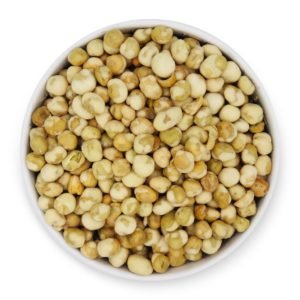
wonder: What are Wasabi peas? Well, they are mainly trendy in Japan. Recently, they started gaining popularity in the United States as a spicy treat that goes well with beer. They are made when Marrowfat is allowed to dry in a field through a natural process. After the peas are harvested, they get roasted and coated in starch, oil, and wasabi powder. In addition to going well with beer, they can be eaten with sake, soda, and even water.
It is important to note that some wasabi peas are very hot. Hence, consume them slowly. The familiar flavor they give comes from the wasabi powder. Unfortunately, real wasabi is expensive, so many commercial products hardly contain any real wasabi.
Are Wasabi Peas Keto?
It is not advisable to use wasabi peas when making a keto diet. This is due to high levels of carbohydrates and vegetable oil in them. They contain about 56.79 net grams for each 100g serving. The carb levels are higher than the recommended 20-30g for someone on a keto diet. The vegetable oils used in them are highly refined oils prone to oxidation and may cause inflammation.
Are Wasabi Peas Healthy? – 3 Reasons
So, are Wasabi Peas healthy? Yes! There is no doubt that they are yummy, tasty treats that offer fantastic health benefits. However, remember that while Wasabi peas provide fiber and protein, they lack additional vitamins and minerals. Therefore, when eating, approach consumption with moderation in mind. This article has examined both the pros and cons of wasabi peas, and it’s left for you to choose based on what is healthy and safe for you.
FAQ: Are Wasabi Peas Healthy?
Are wasabi peas a healthy snack option?
Yes, wasabi peas can be a healthy snack when consumed in moderation due to their calorie density. A 100-gram, 3.5-ounce serving contains about 430 calories, making portion control important to avoid unintended weight gain.
What are the nutritional benefits of wasabi peas?
Wasabi peas offer several nutritional benefits, including a good amount of fiber, which aids digestion and cholesterol management. They also provide plant protein, helping to keep you full and contributing to muscle maintenance and growth.
How much protein and fiber do wasabi peas contain?
Wasabi peas are a source of plant protein and fiber. A serving can provide around four grams of protein and a significant amount of dietary fiber, contributing to daily nutritional requirements.
Are wasabi peas gluten-free?
Many wasabi pea brands are not gluten-free due to the presence of gluten in their ingredients. However, gluten-free options are available, so it’s important to check product labels if you have gluten sensitivities or celiac disease.
What exactly are wasabi peas?
Wasabi peas are a snack made from dried Marrowfat peas that are roasted and coated in starch, oil, and wasabi powder. Originally popular in Japan, they have gained popularity in the United States as a spicy snack that pairs well with beverages like beer and sake.
Can wasabi peas be included in a keto diet?
Wasabi peas are not recommended for a keto diet due to their high carbohydrate content and the use of highly refined vegetable oils. A 100g serving contains about 56.79 net grams of carbohydrates, exceeding the daily carb limit recommended for ketogenic diets.
How should I consume wasabi peas?
Wasabi peas should be eaten with caution due to their potential spiciness and calorie density. They’re best enjoyed in moderation as part of a balanced diet to take advantage of their health benefits without overconsuming calories. Toss them into salads and use them to make a trail mix snack.
Are wasabi peas worth including in my diet?
Wasabi peas can be a tasty and beneficial addition to your diet when eaten in moderation. They offer fiber, protein, and other nutrients, making them a healthy snack choice if you manage portion sizes and dietary balance.
Sam Henselijn Author’s Biography – Meet L’Orenta Nuts CEO
Copyright 2024 L’Orenta Nuts
L’Orenta Nuts proudly holds the SQF food safety certification, symbolizing our unwavering dedication to upholding the highest standards of food safety and quality. This certification guarantees that our products undergo rigorous scrutiny, ensuring transparency, traceability, and adherence to global food safety regulations for the utmost consumer confidence.
L’Orenta Nuts has the HACCP (Hazard Analysis and Critical Control Points) certification is a systematic approach to identifying, evaluating, and controlling food safety hazards. It ensures that food products are produced and handled in a manner that minimizes risks and complies with safety standards.
Our GMP (Good Manufacturing Practices) certification ensures that a manufacturing facility adheres to comprehensive quality and safety standards while producing pharmaceuticals, food, and other consumer goods, promoting consistency, quality, and compliance with regulatory requirements.
L’Orenta is an FDA-approved manufacturing facility and has met the rigorous standards set by the U.S. Food and Drug Administration. It demonstrates compliance with regulations, ensuring the production of safe and high-quality food products.


